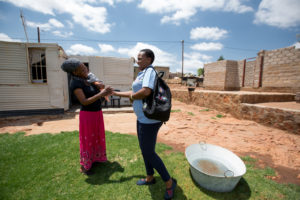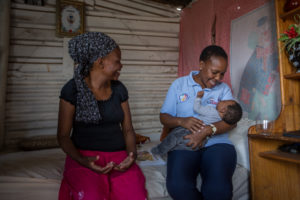Brighter Futures
“Only God knows what would have happened to the child if we did not enter the family’s home.” — a South African Family Mentor working to make sure that all children, especially the most vulnerable, have the opportunity to thrive.

Family Mentor visiting mother and malnourished baby
When mothers2mothers (m2m) Family Mentor Matlakala and her colleagues were going door-to-door last August to make sure that all children and family members were accessing the healthcare they needed, they were told that there was a sick child in the house next door. As soon as they saw the child, they knew something was wrong. “The first obvious condition I picked up was the skin problem, but the big one that prompted me to pay special attention was that the child looked extremely small for his age,” says Matlakala. “Honestly, I think the child would have eventually died. The mother hadn’t brought him to the clinic because she didn’t know what was wrong with him,” she adds.
She measured the circumference of the baby’s arm and determined that he was malnourished. She referred the mother to the clinic, and when she arrived the next day, Matlakala was there to support the mother and her child.
Matlakala is one of 26 Family Mentors – mothers living with HIV with children between 0-5 years – who are part of m2m’s Early Childhood Household Stimulation (ECHS) programme in South Africa funded by FHI360. Operating for the last two years in seven communities in Mpumalanga Province that have a high prevalence of HIV, the programme supports parents and caregivers at their homes to provide vulnerable children with a range of safe, accessible, and comprehensive early childhood development services.
A growing body of evidence shows that quality healthcare, proper nutrition, and social-emotional and early learning stimulation through the first 1000 days are the foundations for success later in life. Children deprived of these developmental influences are likely to have low educational levels, low income as adults, and poor parenting skills, thus perpetuating the cycle of intergenerational poverty and childhood deprivation.
Particularly vulnerable are HIV exposed or positive children. According to the United States Agency for International Development (USAID) and the President’s Emergency Plan for AIDS Relief (PEPFAR), improving the well-being of vulnerable children and youth by mitigating the impact of HIV and AIDS reduces their vulnerability and increases their resilience and likelihood that they will grow up to be healthy, educated, and socially-adjusted adults.

Family Mentor talks to mother about child’s development
Matlakala and her colleagues are working to make sure that the baby they saw in August has that opportunity. That child, now 10 months old, is gaining weight and doing well. The Family Mentors are educating his mother about hygiene, home safety, and how to stimulate the child on her own to make sure he reaches his developmental milestones.
“Since m2m started ECHS in South Africa, the children are really getting help. In the community there is poverty and little knowledge about maintaining good health. I am thankful that m2m is helping the young ones,” Matlakala says.
m2m also currently provides Early Childhood Development services in Swaziland, Lesotho, and Kenya.






















